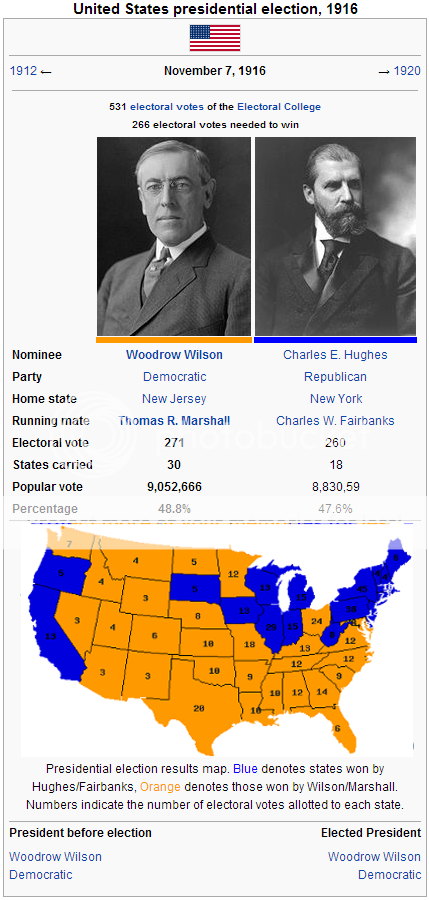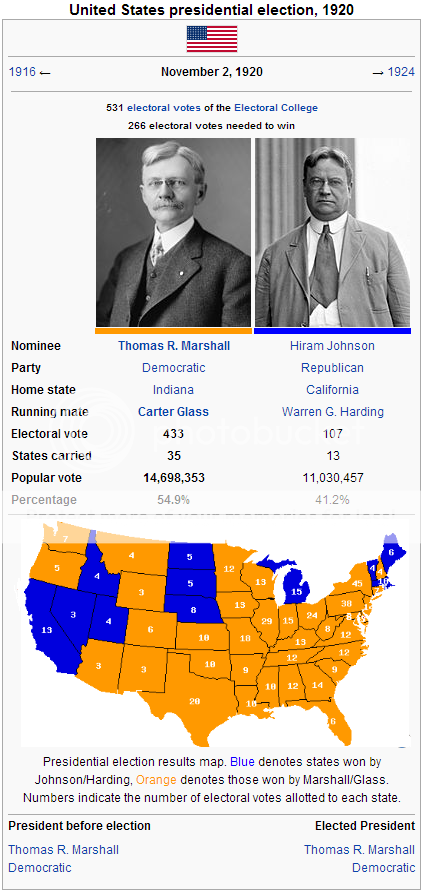A Minor Meighen Majority
Here's 1994:
Having been re-elected in 1989, Prime Minister Jack Horner had what few of his preceding Conservative Prime Ministers had had. With his majority government only the third Conservative majority since the ill-fated Meighen government over six decades earlier, Horner had the opportunity to change what he called the "
culture of entitlement" he claimed ran amok in Ottawa.
To this end, Horner launched what he branded his "
Democracy Campaign," hoping to increase power to individual MPs, give more power to Canadian citizens (such as the power to force recall votes), and require Senate elections, the latter largely to stop the Liberal-dominated Senate Horner had faced during his terms as Prime Minister. Horner's government was able to pass the first two items relatively easily, with the first passing with all-party approval and only limited opposition to recall votes. However, the issue of Senate reform was another issue.
To accomplish Senate reform, Horner had to re-open the constitutional debate. While the 1982 Constitutional talks had been relatively controversy-free, most of the Premiers involved in that round of talks had left office, with most of their successors feeling that their province had left the talks with less than they had wanted. While most Premiers lobbied incredibly hard to amend other parts of the constitution, Horner insisted that he would only discuss the Senate, turning the talks into something of a joke. Horner's real problem, though, was his insistence that the distribution of seats in the Senate must reflect the population of the country, which elicited fierce opposition from everywhere east of Ontario, which had benefited from the current seat distribution. Leading the charge against Horner was Quebec Premier Jean Chretien, who, as Trudeau's Justice minister during the early part of the 1980s, knew how he could force Horner's hand on the issue.
While Horner, fully committed to Senate reform, lobbied hard to get Chretien on his side, he unknowingly alienated those in Western Canada, who felt that, once again, the government of the day was ignoring their interests and catering to Quebec. With the Western Premiers beginning to turn on him, Horner, in 1992, realized that he would not be able to pass his long-hoped for plan to democratize the Senate, and abandoned the talks altogether, talks which had resulted in his governments popularity dropping substantially.
While Horner attempted to recover from the unpopular and unsuccessful constitutional talks he had initiated, other scandals began plaguing his administration, as his "
Democracy Campaign" began to backfire on him. Though every party had agreed to it, Horner was hurt from his plan to give more power to MPs, as a group of Conservative (and some National Liberal) MPs nearly managed to bring back the death penalty. Even worse, an embarrassing incident arose when CBC News reported that a large group of constituents were attempting to recall Horner in his safe Conservative seat. Though the attempt failed, the media had a field day with the story.
With the scandals plaguing his government, the Conservatives looked to the next election, which looked set to be delayed until 1994. While Horner had contemplated resigning, the Conservative Party executive convinced him to stay, arguing that stable poll numbers and a decrease in funds meant that the Conservatives would lose the next election, no matter who their leader was, and that Horner at least had experience running a campaign. With this in mind, Horner decided to bite the bullet and stay on as Conservative leader into the next election.
The election was largely fought over the record of Horner's government, meaning that the Conservatives were always expected to lose. While Horner ran a valiant campaign, and at times seemed to be slowly chipping away at the strong National Liberal lead, all this progress was torpedoed following a CBC report midway through the campaign that, during the early 1970s, Horner had lobbied then-Prime Minister James Sinclair for a cabinet post in exchange for crossing the floor to the National Liberal Party. While Horner denied the story, it only worsened Canadians' opinions of him. National Liberal leader Bob Kaplan, meanwhile, had improved significantly as a campaigner, and had led the Official Opposition largely free of scandal.

With all this in mind, the results of the election proved to be a surprise, but only because the National Liberals, which won election to a majority government of 212 seats and 54.2% of the vote, had done
worse than expected, while the Conservatives, with 55 seats and 25.2% of the vote, had done
better. Kaplan was thus handed the keys to 24 Sussex, while Horner, after 14 years, announced his resignation as Conservative leader.
Prime Ministers of Canada:
William Lyon Mackenzie King (Liberal) 1921-1925
Arthur Meighen (Conservative) 1925-1933
Charles Avery Dunning (Liberal) 1933-1939
James Garfield Gardiner (National Liberal) 1939-1953
Brooke Claxton (National Liberal) 1953-1957
Howard Charles Green (Conservative) 1957-1965
James Sinclair (National Liberal) 1965-1973
Alan Eagleson (Conservative) 1973-1980
Jack Horner (Conservative) 1980
Pierre Trudeau (National Liberal) 1980-1984
Jack Horner (Conservative) 1984-1986
Pierre Trudeau (National Liberal) 1986-1987
Jack Horner (Conservative) 1987-1994
Bob Kaplan (National Liberal) 1994-present
A Minor Meighen Majority
Canadian Federal Election 1925
Canadian Federal Election 1929
Canadian Federal Election 1933
Canadian Federal Election 1937
Canadian Federal Election 1940
Canadian Federal Election 1945
Canadian Federal Election 1950
Canadian Federal Election 1955
Canadian Federal Election 1957
Canadian Federal Election 1958
Canadian Federal Election 1961
Canadian Federal Election 1965
Canadian Federal Election 1967
Canadian Federal Election 1969
Canadian Federal Election 1973
Canadian Federal Election 1977
Canadian Federal Election 1980
Canadian Federal Election 1984
Canadian Federal Election 1986
Canadian Federal Election 1987
Pierre Trudeau
Canadian Federal Election 1989



